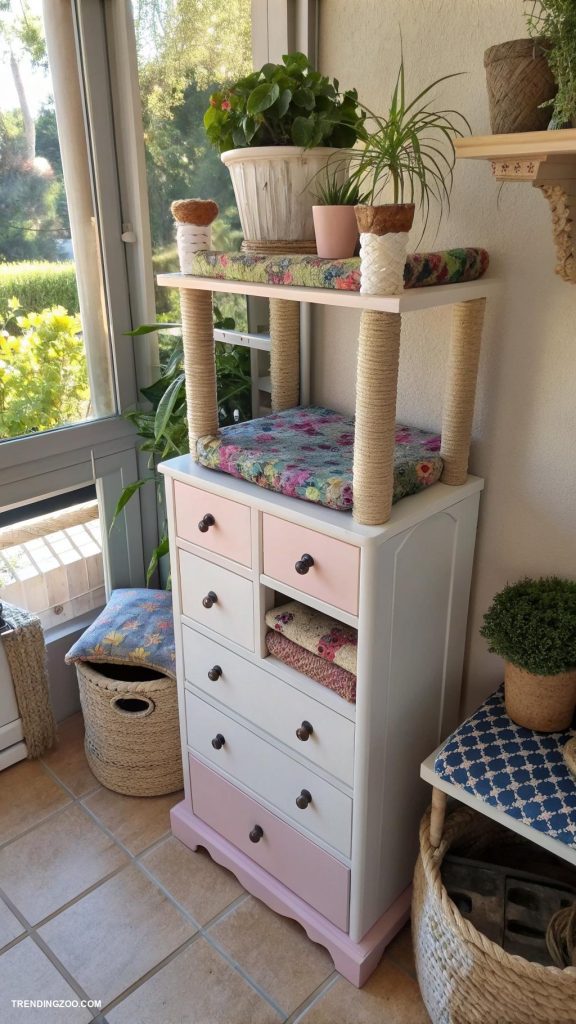The Abyssinian, with its striking ticked coat and energetic demeanor, is a breed of cat that has captured the hearts of many cat enthusiasts. Originating from Ethiopia, this ancient breed has been a favorite among royalty and commoners alike for centuries, and its popularity shows no signs of waning. With its large almond-shaped eyes, delicate features, and playful personality, the Abyssinian is a true showstopper in the feline world.
But what makes this breed truly special is its unique energy and curiosity, which sets it apart from other domesticated cats. Whether you’re a seasoned cat owner or just starting to think about bringing a new furry friend into your life, the Abyssinian is definitely a breed worth considering.
History and Origin of the Abyssinian Cat
The Abyssinian cat breed has a rich and fascinating history that dates back centuries. Originating in the ancient land of Abyssinia, which is now modern-day Ethiopia, this breed is believed to have been bred by the royal families of the region. It is said that the earliest recorded mention of the Abyssinian cat was in the 17th century, when European traders and travelers first encountered the breed during their journeys to the East African region.
Initially, the breed was known as the “Abyssinian” due to its supposed origins in Abyssinia, but it was later renamed “Abyssinian” to reflect its true origins in Ethiopia. Despite its long history, the breed remained relatively unknown in the Western world until the late 19th century, when it was first introduced to Europe by British and American breeders.
Today, the Abyssinian is a popular and beloved breed around the world, prized for its striking appearance, playful personality, and intelligence.
Physical Characteristics of Abyssinian Cats
Abyssinian cats are known for their striking physical characteristics, which set them apart from other breeds. Their coat is one of their most distinctive features, with a thick, woolly texture and a unique ticked pattern. The ticking, or agouti pattern, is characterized by bands of color on each hair shaft, giving the appearance of a subtle, mottled effect.
The coat itself can range in color from a warm, golden red to a darker, richer brown, with a silvery sheen in certain lighting conditions. Abyssinians also have a distinctive facial structure, with a flat forehead, a short, upturned nose, and wide-set ears that are slightly rounded at the tips.
Their eyes are almond-shaped and slanted, with a bright, inquisitive expression. Their body is slender and athletic, with long legs and a deep chest, giving them a lithe, agile appearance.
Overall, the physical characteristics of the Abyssinian breed combine to create a striking and exotic-looking cat that is sure to turn heads.
Personality and Temperament
When it comes to the Abyssinian cat breed, one of the most striking aspects of their character is their unique personality and temperament. Known for being highly intelligent and curious, Abyssinians are often described as being like little furry scientists, always exploring and investigating their surroundings.
They have an instinct to get into everything, which can sometimes be a challenge for their owners, but it’s also a testament to their insatiable curiosity and love of learning. In terms of temperament, Abyssinians are generally considered to be friendly, outgoing, and extremely social. They thrive on interaction and attention, and they love to be the center of attention.
They are also known for being very playful and energetic, and they require plenty of exercise and stimulation to keep them happy and healthy. Despite their high energy levels, Abyssinians are also known for being very affectionate and loving, and they make great lap cats for those who are willing to provide them with the attention and interaction they crave.
Overall, the Abyssinian’s unique personality and temperament make them a joy to be around, and their curious and playful nature is just one of the many reasons why they are such a popular breed among cat lovers.
Care and Grooming Requirements
As a proud owner of an Abyssinian cat, it’s essential to understand the care and grooming requirements to keep your feline friend healthy and thriving. Abyssinians have a unique, ticked coat that requires regular brushing to prevent matting and tangling. Daily brushing is recommended, using a slicker brush or a pin brush, to remove loose hair and distribute skin oils that keep their coat shiny and healthy.
Abyssinians shed heavily during seasonal changes, so be prepared to brush more frequently during these periods. It’s also crucial to clean their ears weekly, remove dirt and wax buildup, and trim their nails every 4-6 weeks to prevent overgrowth. Bathing is not necessary unless your Abyssinian gets into something sticky or smelly, as their oils can help keep their coat clean.
However, it’s still important to wipe their face and paws daily with a damp cloth to remove dirt and debris. By following these care and grooming guidelines, you’ll be rewarded with a happy, healthy, and stunning Abyssinian cat that will bring joy to your life for years to come.
Health Concerns Specific to Abyssinians
Abyssinian cats are a unique and beloved breed, known for their striking ticked coats and playful personalities. However, like all cats, they can be prone to certain health concerns that responsible breeders and owners should be aware of.
One of the most common health issues affecting Abyssinians is patellar luxation, a condition where the kneecap slips out of place. This can be caused by a genetic predisposition or trauma, and may require surgery to correct. Another concern is hypertrophic cardiomyopathy, a heart condition that can lead to heart failure if left untreated.
Abyssinians are also prone to dental problems, such as tooth resorption, which can cause pain and discomfort for the cat.
They can be susceptible to skin problems, including acne and eczema, which can be caused by allergies or environmental factors. Regular veterinary check-ups and a healthy lifestyle can help prevent or manage these health concerns, and responsible breeding practices can help reduce the incidence of these issues in the breed as a whole.
Training and Socialization Tips
When it comes to training and socialization, Abyssinian cats are known for their intelligence and curious nature, making them a delight to work with. From a young age, it’s essential to establish a routine that includes playtime, interaction, and positive reinforcement.
Start by introducing your kitten to a variety of toys, textures, and surfaces to encourage exploration and curiosity. Use treats and praise to reward good behavior, such as coming when called or performing tricks. Socialization is also crucial, as Abyssinians can be prone to shyness and aloofness if not exposed to new people, sights, and sounds.
Introduce your kitten to different environments, such as car rides, vet visits, and meeting new people, to help them become confident and calm in new situations. As they grow, provide plenty of attention and affection to help them develop strong bonds with their human family.
With patience, consistency, and positive reinforcement, you can help your Abyssinian cat become a well-adjusted and loving companion.
Living Environment and Compatibility with Other Pets
Abyssinian cats are known for their adaptability to various living environments, making them a great choice for city dwellers and country folk alike. They thrive in homes with plenty of space to roam and play, but they can also do well in smaller apartments as long as they receive regular attention and exercise.
In terms of temperature, Abyssinians prefer a comfortable room temperature between 60 to 70 degrees Fahrenheit, but they can adjust to warmer or cooler temperatures with ease.
When it comes to compatibility with other pets, Abyssinians are generally friendly and get along well with other cats, especially if they are introduced to each other at a young age.
However, as with any cat breed, it’s essential to socialize them well and monitor their behavior around other pets to ensure a harmonious household.
They can also coexist with dogs, especially if the dog is well-behaved and not too large. Some Abyssinians have been known to form close bonds with their canine counterparts. With patience, love, and proper introduction, Abyssinians can make wonderful additions to multi-pet households.








